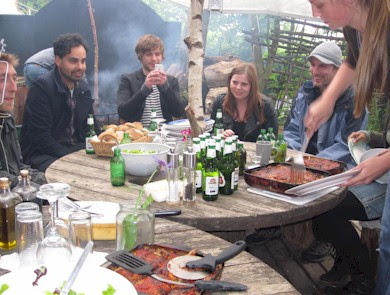Spanish-British fusion: a long distance conversation
I assembled and edited most of the Lives in Music podcast episode that accompanies this post on the fifth anniversary of the death of a mutual friend, the great Paul Murphy, who both introduced me to Renny Jackson, and encouraged us both, as he did with everybody he worked with, in our different projects.
One of the things Paul had me do on his Thursday Song Writers Café nights was to interview each artist about their own creative process.
How do songs arrive?
I asked that question of maybe a hundred or more of Paul's guests. I got a different answer each time. Everyone, it turned out, had a different approach. Renny was thoughtful, open and honest.
So it was that I talked at length with Renny, who originally came from Birmingham, before he delivered a charming and articulate set on his brief return to the city.
To listen to the Lives in Music podcast episode, go here, or simply scroll down to the bottom of this post.
LockdownThere's a twist to this series of Lives in Music podcasts. We're all stuck in lockdown, and so I am asking each guest about how it affects them. Now, as you'll hear, Renny is now based in Sevilla in Spain, where the oranges come from. And they have hassles too, just like us. In fact, not quite as bad as us, but enough to put a stick in the wheel of new live projects. The two influences come together in Renny's music.
A 1500 mile conversation
Obviously, we recorded our conversation remotely. This is a step on from Zoom - radio-oriented software, for a start - but it felt absolutely right chatting, in a very personal way, with someone who now lives fifteen hundred miles away. Tech may have messed us all up in its different ways, but little things like software that lets you straddle boundaries certainly help.
Renny's take on the lockdown in Spain is an interesting variation on what problems face musicians in the UK. We'll also hear the impact Spain has had on this Brit.
LinksRenny's facebook page
The River Roots single on YouTube
Renny Jackson on Spotify
Renny's Lives in Music episode
The Lives in Music Podcast series
I've been doing this for about two years now. These are interviews with local
musicians, looking at how music has shaped them throughout their lives. Series 3
also looks hard at how lockdown has had an impact. There are some lovely stories.
To see who's in the list of artists, here's a link to see every episode.One further footnote: the intro and outro flourishes I'm using in this series of Lives in Music come from Vo Fletcher, who is also featured in this series, along with Loz Lozwold. I asked Vo for a bit of live impro, and this was the result.The Radio To Go blog
This blog has been going since 2007. I started it to focus mainly on radio stories, as the industry went through convulsive changes. Those changes aren't over yet, not by a long chalk. I then expanded the range of topics to cover local music, another subject close to my heart. I think it was a Destroyers gig that pulled me in that direction. I've banged out several hundred posts since then, and of course deleted quite a few. But if you're interested in thoughts on the local scene and/or radio futures, by all means visit the full topic index on the Radio To Go blog.
________________________________________________________________________
Subscribe to the mailing list!



















